TVs at CES 2024: The big, the bright, and the see-through
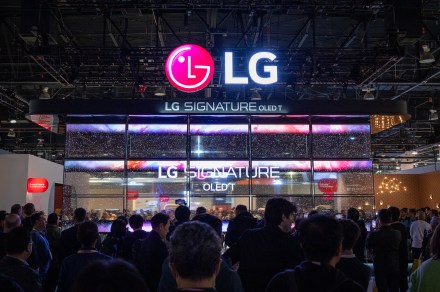
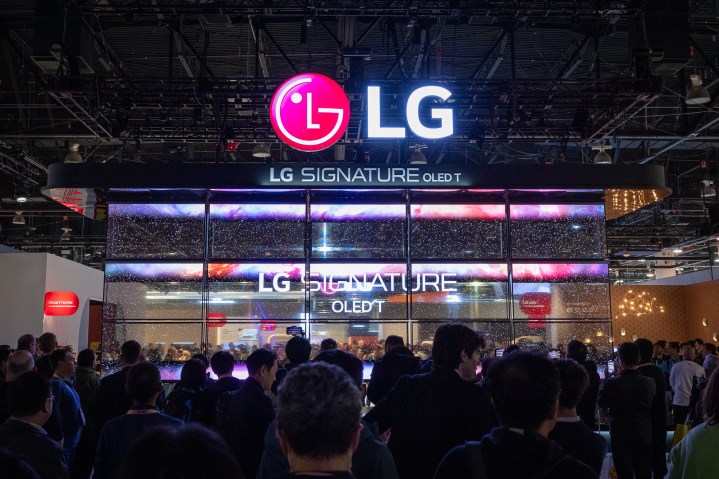
Trying to reduce the story of televisions at CES 2024 is a fool’s errand. There are too many, with too many purposes. Some of the sickest tech you’ll see isn’t even meant for consumer use. Some will be well out of your price range. All of it was incredible.
And that just about sums it up.
OK, that mostly sums it up. But given that literally everyone at CES is involving “AI” in one way or another, it’s worth a mention here. Everyone’s using AI somehow. You’ll mostly hear it in the context of picture processing, and that’s not nothing. Nor is it exactly new. But AI is all the buzz these days, even if it’s quickly just becoming how things work. AI processing has found a place alongside traditional graphics and computational processing. At some point, though, it’ll just fade into the background and isn’t really something you need to think about as the person sitting in front of the TV.
We’re going to barely scratch the surface here — and definitely check out our Top Tech of CES 2024 for additional perspective — but here’s everything you need to know about the state of future televisions, as seen at the Consumer Electronics Show in Las Vegas.
LG goes see-through
We’re hard-pressed to say that a single company stole the show in terms of televisions. But force us to do so, and LG absolutely is in the running thanks to the 77-inch LG Signature OLED T. That “T” stands for transparent.
As we’ll talk about a little more in a minute, transparent displays aren’t anything new. They go back years, actually. But this one’s a big deal for a couple reasons. First is that it’s a transparent OLED. And that means it’s adding transparency to the best panel tech. But even more important is that the Signature OLED T is a transparent television that you’re actually going to be able to purchase later this year. It’s not theoretical technology being shown for the sake of demonstration. You’ll be able to put this in your home.
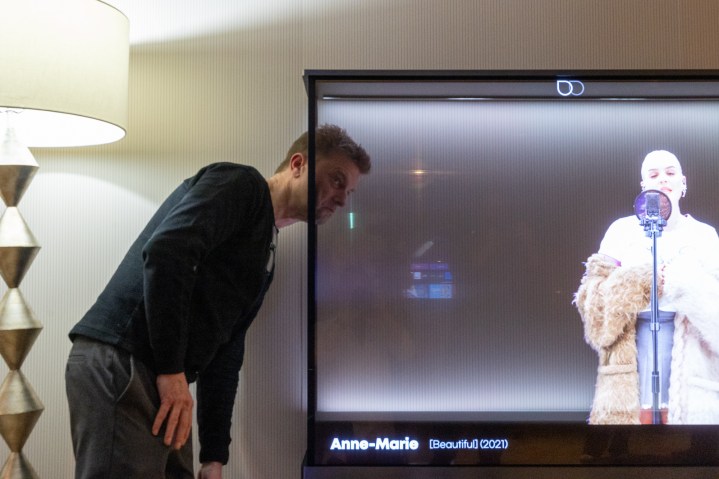
That’s assuming a couple things. First, of course, is price. LG wouldn’t (and in all fairness, likely couldn’t) tell us how much it’s going to cost. Chances are it’s going to be a lot. At a guess? Maybe $20,000. Possible $30,000. That’s a total guess, though. But I wouldn’t bet against it.
And assuming that you can even afford this sort of tech, you’re going to want to put it in a place people can see it, in a way that everyone can enjoy it. It’s going to be a definite conversation starter, and not just the sort of thing you slap up on a wall to let it do its thing. And to be clear, whatever is behind it — be it wall, or panoramic view from whatever penthouse you put it in — will be very much a part of the picture, too. Your basic 1980s drywall build isn’t going to do it justice.
LG also had updated versions of its traditional OLED models. Those are the ones for most folks out there. The story there is mostly iterative. Better specs, with that story mostly surrounding LG’s Alpha line of processors. They’re better. Faster. Deeper. All the adjectives. The bottom line? The LG M and G series will remain excellent options well into 2025.
And lest we forget about the sort of future tech we’re really here for, LG Display (the company that actually makes the panels) broke out some huge news with 3,000-nit “META 2.0” displays, bringing a new era of brightness to OLED. It’s a sight to behold.
Samsung cuts down the glare
Samsung is the other Korean manufacturer that does so much it’s easy to get lost in the shuffle. And it had a ton to show this year. But perhaps the most important demo we saw was the one that cuts down on the glare that’s long been inherent in OLED televisions.
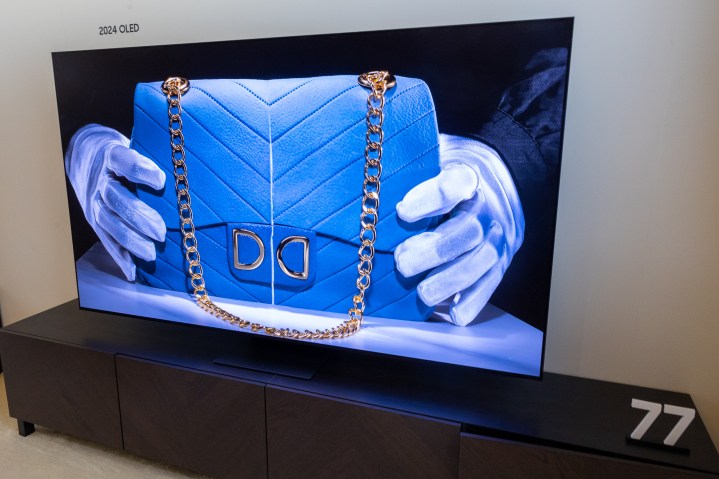
If you have an OLED screen today, you’re likely well aware of just how easy it is to spoil an otherwise excellent experience with a single light on in the background somewhere. And while this is the sort of thing that’s very dependent on your setup, and that a controlled demonstration may handle better than we’ll see in real life, that demo worked well enough. On one side there was an older OLED TV, with the glare from a fake window front and center. Next to it was a new panel with the glare all but gone.
That’s maybe not a reason to throw out your old Samsung OLED, but it’s definitely something you’ll want to look for in your next one.
Samsung also was showing off some see-through tech at CES. It’s not a made-for-consumers thing yet like what LG had on hand, but Samsung’s transparent micro-LED panels were very cool. It’s the sort of thing that still pictures can’t really do justice — you lose a bit of the depth effect. But in person, it’s very cool. And what we saw is very much the sort of thing you could see in some sort of business or informational setting — maybe in a museum? Or all over Las Vegas, now that I think about it.
Samsung had the transparent micro-LED screens alongside transparent OLED and LCD displays, so it was interesting to see the different flavors of the tech, and how they work.
TCL goes big — 115 inches big
Size matters. Especially in Las Vegas. And TCL brought a monster of a QM8 television in the form of a 115-inch behemoth it’s calling the QM89.

It’s ginormous, with some 20,000 dimming zones controlling the mini-LED backlighting of the 4K picture. It’s stunning with demonstration content on it. You have to wonder just how well it’ll handle the seriously compressed video that plagues streaming — particularly when it comes to live, linear video. But there’s no denying that it’s a sight to see.
There are still plenty of questions here. For one, TCL hasn’t yet settled on the feet that’ll stand this beast up from the floor. And another is price. TCL’s current 98-inch QM8 costs $6,000 at retail. How much more will this TV fetch? Don’t be surprised to see it closer to $10,000. (That’s totally a guess at this point, though.)
Hisense also does big and bright
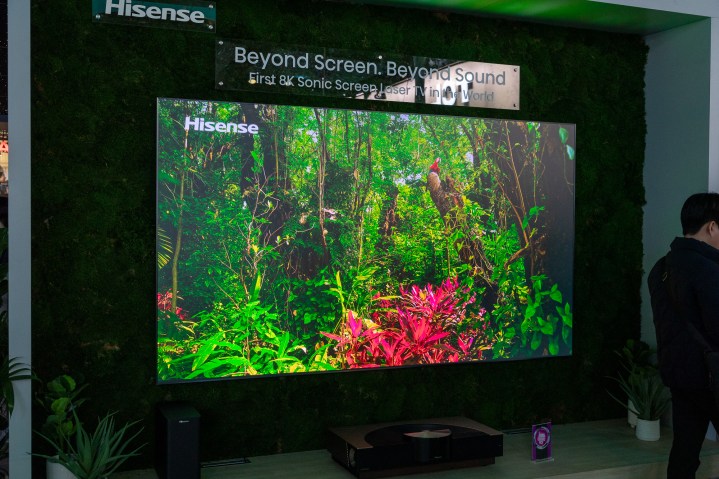
Look, words like “big” and “bright” just describe the meat and potatoes of CES. Everything there is big and bright.
But consider the following: 110 inches and 10,000 nits. That’s what Hisense had on hand with its aptly named 110UX, a quantum dot-powered, mini-LED 4K TV.
That was just the biggest and brightest drop in the bucket, though. The likes of the 98UX (98 inches, naturally) also should prove to be pretty popular this year, especially when you take the audio features into account.
The QDEL exclusive
If you’ve somehow not seen all our incredible video coverage of the televisions of CES, it’s far past time to head over to our YouTube channel. Especially since we had a late-breaking discovery deep in the bowels of the show.
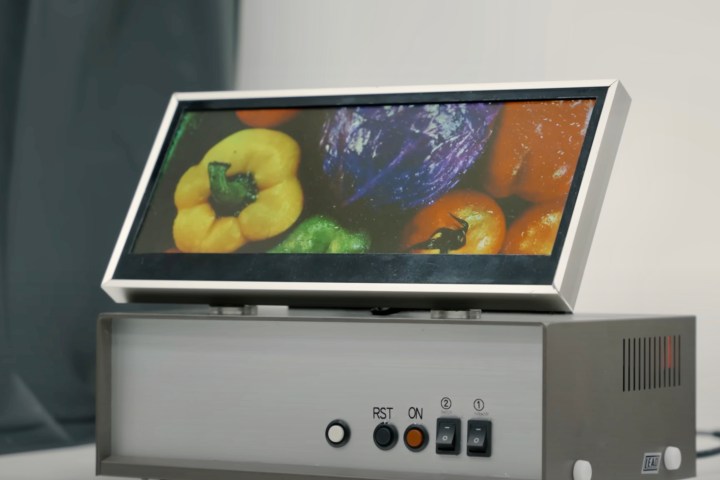
Meet QDEL. Yes, it’s another TV tech acronym along the lines of QLED and OLED and QNED and QSED. (I made up one of those just now. You decide which.) It stands for quantum dot electroluminescent display.
This is all in prototype form at the moment. But it’s a big deal because it’s much easier to manufacture than traditional OLED displays. (And that should, hopefully, mean it’s less expensive for the consumer.) And it’s a big deal because … well, we’ll just let Caleb explain in the video below.
QDEL Is Real | Sharp Display Ready To Make Self-Emissive Quantum Dot Displays
A first look at Telly
One of the … weirder … stories of 2023 was Telly. The company is led by the founder of Pluto TV and came out of a two-year stealth period. And it did so with the promise of a 55-inch television with a built-in soundbar that it’s giving away for free.

Of course there’s a catch, and that comes in the form of a secondary display that is home to some pretty consistent display advertising. You get a free TV, and Telly sells ads to your eyeballs (in addition to getting all kinds of data about what you’re watching).
I was as skeptical as anyone around here about how any of this would actually work. But after sitting down with Telly in a Las Vegas hotel suite for a half hour? I was surprisingly impressed. That’s not to say I’m not still skeptical — I very much am, and this TV definitely isn’t going to be for everyone.
But the execution of Telly as a device? Far better than I expected.
Sony silent once more
If you’ve read this far and were wondering just where was Sony during CES, well, we tried to warn you. For the second year in a row, Sony didn’t have anything new to show in Las Vegas.
That doesn’t mean Sony is going to sit out 2024. Quite the contrary, in fact. We’re just going to have to wait a little longer.
Editors’ Recommendations
-
Sharp secretly revealed the first QDEL TV at CES -
My flight home from CES 2024 proved that the world needs Auracast -
McIntosh and Sonus faber demo a $1 million anniversary sound system at CES 2024 -
Could LG’s 3000-nit OLED finally end the brightness wars? -
Hisense shows off massively bright 98- and 100-inch TVs


